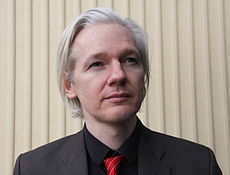Here is a lesson for many. One benefit I have of spending so many years working at Microsoft is be very careful what you put in e-mail. (note I left Mircosoft in 2006) Assume anything you put in writing could be read by the DOJ. If you want to have a private conversations don't use e-mail. Read the following to understand the risks of thinking e-mail is private.
Wikileaks is making news disclosing for the public what people assumed were private conversations.
WikiLeaks
From Wikipedia, the free encyclopedia
WikiLeaks is not affiliated with Wikipedia or the Wikimedia Foundation.
Julian Assange, the main spokesperson and editor-in-chief for WikiLeaks
WikiLeaks is an international non-profit organisation that publishes submissions of private, secret, and classified media from anonymousnews sources and news leaks.
Wikileaks is so popular it now has imitators. Red Tape discusses an example.
Do WikiLeaks imitators put your e-mail at risk?
Posted: Tuesday, March 1 2011 at 06:00 am CT by Bob Sullivan
Imagine having every e-mail you've written published by hackers for the entire world to see. You don't have to stretch your imagination very far -- it's already happening to some folks.
Here an example of what has caused a huge embarrassment for security company.
Hackers who call themselves Anonymous -- the group that has gained notoriety for attacking Visa and MasterCard in defense of WikiLeaks -- broke into computers operated by a government contractor named HBGary Federal in early February. Once inside, Anonymous members wreaked all kinds of electronic havoc, including the theft of thousands of employee e-mails. These were then published in searchable form on a Web site similar to WikLeaks, leading to a host of embarrassing disclosures for HBGary employees. The incident drew so much attention that it was featured in a recent segment on “The Colbert Report.”
Which was so embarrassing the CEO just resigned.
Aaaron Barr, HBGary Federal CEO, resigns
The CEO of HBGary Federal, Aaron Barr, has stated that he is resigning his position. In a telephone interview with Threatpost, Barr said that “I need to focus on taking care of my family and rebuilding my reputation ... It's been a challenge to do that and run a company. And, given that I've been the focus of much of bad press, I hope that, by leaving, HBGary and HBGary Federal can get away from some of that. I'm confident they'll be able to weather this storm."
Here is a detailed post on Anonymous's method to break into HBGary.
Anonymous speaks: the inside story of the HBGary hack
By Peter Bright | Last updated 13 days ago
It has been an embarrassing week for security firm HBGary and its HBGary Federal offshoot. HBGary Federal CEO Aaron Barr thought he had unmasked the hacker hordes of Anonymous and was preparing to name and shame those responsible for co-ordinating the group's actions, including the denial-of-service attacks that hit MasterCard, Visa, and other perceived enemies of WikiLeaks late last year.
When Barr told one of those he believed to be an Anonymous ringleader about his forthcoming exposé, the Anonymous response was swift and humiliating. HBGary's servers were broken into, its e-mails pillaged and published to the world, its data destroyed, and its website defaced. As an added bonus, a second site owned and operated by Greg Hoglund, owner of HBGary, was taken offline and the user registration database published.
Over the last week, I've talked to some of those who participated in the HBGary hack to learn in detail how they penetrated HBGary's defenses and gave the company such a stunning black eye—and what the HBGary example means for the rest of us mere mortals who use the Internet.
Hope you think about your e-mail conversations in a different way. All my business friends know anything really private we don't put in e-mail.

